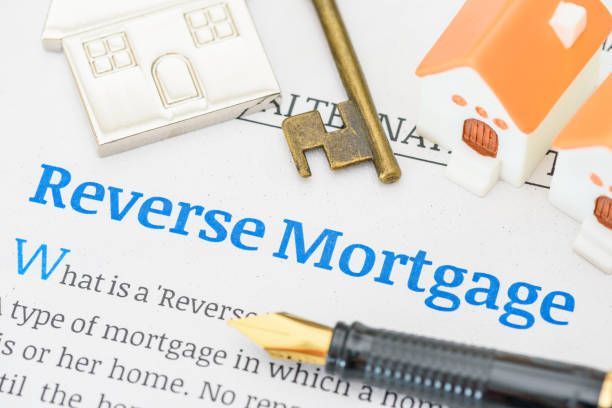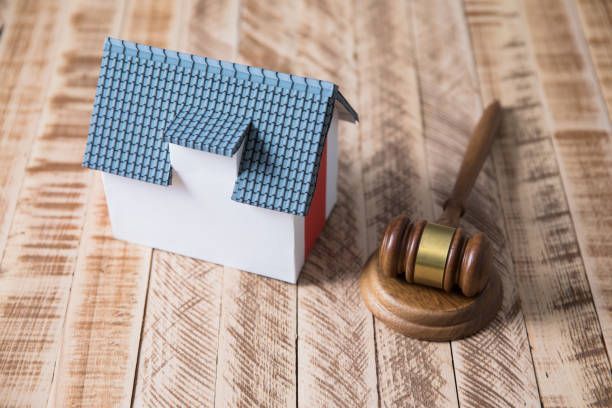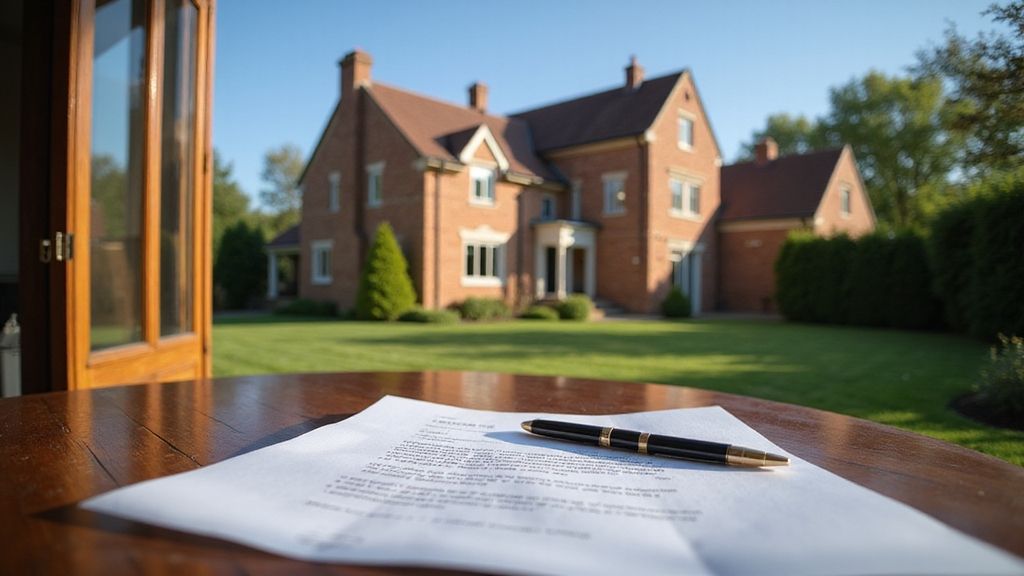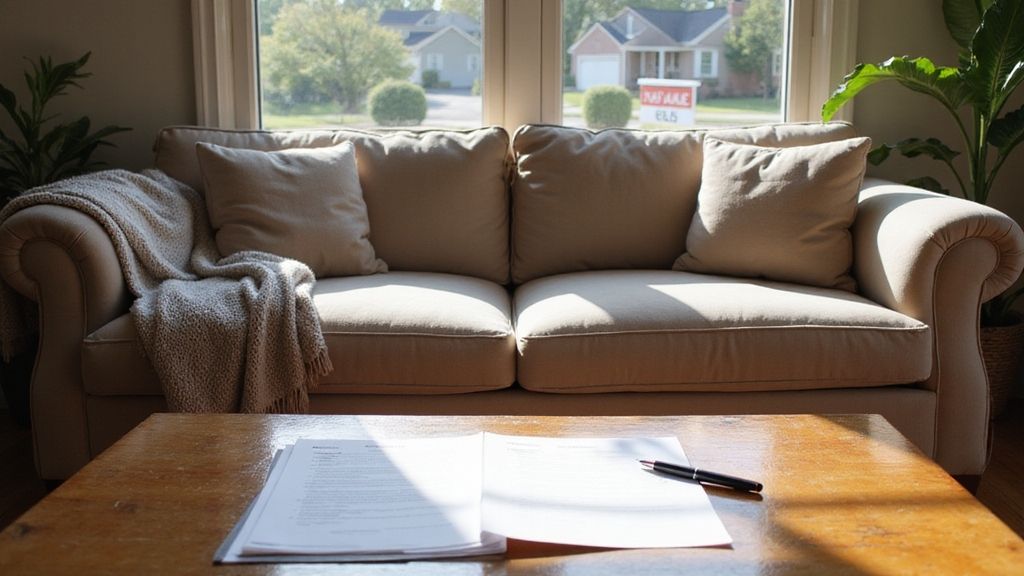What Happens if You Inherit a House With a Reverse Mortgage

Inheriting a house can be a bittersweet experience, especially when it comes with a reverse mortgage. Many beneficiaries find themselves in a confusing and stressful situation. They may not fully understand the implications of inheriting a property with this type of loan.
Questions arise about their rights, responsibilities, and options for the inherited property. The complexities of reverse mortgages can leave heirs feeling overwhelmed and uncertain about their next steps.
This situation can quickly become a financial and emotional burden for the inheritors. They may worry about potential foreclosure or losing the family home. The pressure to make quick decisions without proper knowledge can lead to costly mistakes.
Heirs might struggle to navigate the legal and financial aspects of the inheritance. They may face challenges in communicating with lenders or understanding repayment terms. The fear of making wrong choices can paralyze them from taking any action at all.
Fortunately, heirs have several options when inheriting a house with a reverse mortgage. They can choose to keep the home by paying off the loan balance. Selling the property is another viable option to settle the debt. In some cases, heirs may even be able to refinance the reverse mortgage.
Understanding these choices and their implications is crucial for making informed decisions. Proper guidance can help heirs navigate this complex situation with confidence and clarity.
This blog post will provide a comprehensive guide for those who inherit a house with a reverse mortgage. It will outline the steps to take and options available to heirs.
What Is a Reverse Mortgage?
A reverse mortgage is a financial product for homeowners aged 62 and older. It allows seniors to convert part of their home equity into cash. This can be done without selling the home or making monthly mortgage payments. Instead, the loan balance increases over time. Borrowers can receive funds as a lump sum, line of credit, or regular payments.

If you inherit a house with a reverse mortgage, it’s essential to understand how these loans work. Unlike traditional mortgages, reverse mortgages become due when the borrower dies, moves out, or sells the home. As an heir, you must decide whether to repay the reverse mortgage, sell the property, or let the lender take possession.
Most reverse mortgages are Home Equity Conversion Mortgages (HECMs), insured by the Federal Housing Administration. These loans are non-recourse, meaning you won’t owe more than the home’s value, even if the mortgage balance is higher.
If you want to keep the inherited property, you must repay the reverse mortgage. You can do this by refinancing, using your own funds, or selling other assets. Alternatively, you could sell the home to repay the loan, keeping any leftover proceeds.
It’s important to act quickly when inheriting a house with a reverse mortgage. You usually have 30 days to decide your next steps after receiving notice from the lender. Consulting a financial advisor or estate attorney can help you make the best choice for your situation.
Understanding Inheritance Rights with Reverse Mortgages
When you inherit a house with a reverse mortgage, three key rights apply. First, you can choose to keep the home, sell it, or return it to the lender. Second, you’re entitled to any remaining equity after the loan is settled. Third, reverse mortgages are non-recourse loans, meaning you won’t owe more than the home’s value.
If you decide to keep the home, you must repay the reverse mortgage. The repayment amount is usually the lesser of the loan balance or 95% of the home’s appraised value. This allows you to retain the property even if it has less equity than the loan.
If you opt to sell the home, you can use the sale proceeds to pay off the loan and keep any extra funds.
As an heir, you aren’t personally responsible for the reverse mortgage debt. This non-recourse feature protects your other assets, no matter the home’s value.
However, it’s important to act quickly. You generally have 30 days to make decisions after receiving notice.
Seeking legal advice is vital when navigating inheritance rights with reverse mortgages. An estate attorney can clarify your options, potential tax consequences, and relevant local laws.
Inheriting a home with a reverse mortgage can be complicated, but you have rights and options to safeguard your interests.
Can You Keep the House After Inheriting?
Keeping an inherited house with a reverse mortgage is possible, but there are specific requirements. As an heir, you can keep the home, but you must repay the reverse mortgage. You’ll need to pay the loan balance or 95% of the home’s appraised value, whichever is lower.
If you want to keep the house, you need to act quickly. You typically have 30 days to decide after receiving notice from the lender. During this time, assess your finances to see if you can repay the loan.
To repay the reverse mortgage, you have several options. You can use your own funds, take out a new mortgage, or sell other assets.
Remember, reverse mortgages are non-recourse loans, meaning the loan amount won’t exceed the home’s value.
Consider the emotional aspects of keeping the inherited property. While you may feel attached, weigh that against financial responsibilities.
Also, be aware of potential tax implications, such as capital gains or inheritance taxes.
Given the complexities of inheriting a house with a reverse mortgage, seeking legal advice is wise. An estate attorney can guide you through the process, clarify your rights, and help you decide if keeping the home is the best choice.
Options for Heirs with Reverse Mortgaged Properties
Inheriting a property with a reverse mortgage gives heirs several options. You need to decide how to manage the loan balance.
Your main choices are to keep the home, sell it, or return it to the lender. If you keep the home, you’ll have to repay the reverse mortgage. You can pay the loan in full or refinance the property.
Note that you only need to pay 95% of the home’s appraised value, even if the loan balance is higher.
Selling the property is another option. Proceeds from the sale will first settle the reverse mortgage. Any leftover funds will go to you as the heir.
If you choose not to keep or sell the property, you can return it to the lender. This option is useful if the loan balance is more than the home’s value.
Reverse mortgages are non-recourse loans, meaning you won’t owe anything if the value is less than the loan.
You must notify the lender of the homeowner’s passing to begin this process. Typically, you have 30 days to decide your next steps after receiving the due notice.
Given the complexities, consulting with an estate attorney is wise to understand your rights and responsibilities when inheriting a home with a reverse mortgage.
How Much Time Do Heirs Have to Decide?
Inheriting a property with a reverse mortgage requires prompt action. The loan becomes due upon the homeowner’s death.
First, notify the lender about the homeowner’s passing. This starts the process and begins your decision-making timeline. Generally, you have 30 days from receiving the due notice to decide whether to keep or sell the home.
Consider your options carefully during this period. If you keep the home, you must repay the mortgage. This can be through paying off the loan balance or 95% of the home’s appraised value, whichever is less.
If you choose to sell, the sale proceeds will first pay off the reverse mortgage. Any remaining funds will be distributed to you as the heir.
Emotional attachments to the property can make this decision difficult. However, it’s essential to weigh these feelings against the financial realities involved.
Given the brief time frame and complexities, start evaluating your options as soon as possible. This will allow you to gather information, consult with advisors, and make an informed decision that suits your financial situation and goals.
Paying Off the Reverse Mortgage Balance
For heirs who wish to keep the property, paying off the reverse mortgage is essential. When you inherit a home with a reverse mortgage, repaying the loan is necessary to retain ownership. The amount owed typically equals the lesser of the loan balance or 95% of the home’s appraised value.
You have several options to pay off the reverse mortgage. You can use personal funds, secure a new mortgage, or sell assets. Act quickly, as lenders usually give heirs only 30 days to decide after the due notice.
If the home’s value has significantly increased, the amount owed may be less than the property’s worth. In this situation, paying off the reverse mortgage could be a smart choice.
If the loan balance exceeds the home’s value, you’re in luck. Reverse mortgages are non-recourse loans, meaning you won’t owe more than the property’s worth.
Before making decisions, obtain an accurate appraisal of the home’s value and a payoff statement from the reverse mortgage lender. This information is vital to assess whether keeping the property is financially viable.
What Happens If You Can’t Afford the Payoff?
If heirs can’t afford the reverse mortgage payoff, they’ve three main options. First, selling the house can cover the reverse mortgage debt. This solution is straightforward, as the sale proceeds will pay off the loan. Any leftover funds will go to you and other heirs.
Keep in mind that you usually have 30 days to decide to sell after receiving the notice. Second, you can return the property to the lender. This option, called a “deed in lieu of foreclosure,” allows you to leave the property without further financial obligations.
Remember, reverse mortgages are non-recourse loans. This means heirs aren’t liable for any debt beyond the home’s value.
Lastly, exploring refinancing options or alternative funding sources is another choice. This might mean taking out a new mortgage or pooling resources with other heirs. However, this option may not suit everyone and could cause financial stress.
Emotional considerations also play a role in your decision-making. Family homes often carry sentimental value, which can complicate choices. It’s vital to weigh these emotional factors against practical financial realities.
Regardless of your choice, consulting with an estate attorney is highly advisable. They can help you understand your rights and responsibilities when inheriting a house with a reverse mortgage.
Selling an Inherited House with Reverse Mortgage
When selling an inherited house with a reverse mortgage, prompt action is crucial. As an heir, you generally have 30 days to decide your next steps after receiving notice. If you opt to sell, follow these guidelines to meet obligations and maximize your proceeds.

Start by notifying the lender of the homeowner’s passing. This begins the process. Next, obtain an updated appraisal to assess the property’s value. This is important as reverse mortgages are non-recourse loans. You won’t owe more than the home’s value. If the home is worth more than the mortgage balance, you can benefit from the sale.
To proceed with the sale, you’ll need to repay the reverse mortgage using the sale proceeds. Collaborate with a real estate agent who’s experience with inherited properties and reverse mortgages. They can help set a competitive price and market the home effectively.
Act quickly, as time is vital. A longer selling period means more interest on the reverse mortgage, which can reduce your inheritance. If the sale price is lower than the mortgage balance, you won’t be responsible for the difference due to the loan’s non-recourse nature.
Once the sale is finalized and the reverse mortgage is settled, any remaining funds will be distributed to you and other heirs as per the estate’s terms.
It may also be wise to consult an estate attorney to navigate the legal aspects of the sale and inheritance process.
Common Challenges for Heirs
Inheriting a house with a reverse mortgage brings unique challenges for heirs. You’ll face several hurdles as you navigate this complex situation.
First, you must decide whether to keep the home or sell it. If you keep it, you’ll need to repay the loan balance or 95% of the home’s appraised value. This can be financially daunting, especially if the loan exceeds the property’s value.
Selling the property requires managing the sale process and may mean losing some proceeds to pay off the reverse mortgage.
Time pressure is another challenge. You typically have only 30 days to decide what to do after receiving the due notice. This short time frame can make gathering information difficult.
Understanding the legal implications of non-recourse loans is essential. While you won’t owe more than the property’s value, there are still legal and financial considerations.
It’s important to notify the lender promptly about the homeowner’s death to start the process and avoid complications.
Emotional ties to the property can complicate your decision-making. You may find it hard to balance sentimental value against financial realities.
Lastly, managing tax implications and potential inheritance taxes adds more complexity. Seeking legal guidance from an estate attorney is advisable.
Their expertise can help you understand your options and responsibilities as you face the challenges of inheriting a house with a reverse mortgage.
Tax Implications of Inherited Reverse Mortgages
Inheriting a home with a reverse mortgage can complicate tax matters. Understanding these tax implications is essential for making informed decisions about the property.
When you inherit a home with a reverse mortgage, selling the property may lead to capital gains taxes. These taxes are based on the difference between the home’s value at inheritance and the sale price. If the property has appreciated significantly, you could face a large tax bill.
Additionally, some states impose inheritance taxes on inherited property. Research your state’s laws to see if you’ll owe any taxes on the property.
The reverse mortgage itself can affect your tax situation. If you choose to keep the home and pay off the loan, consider how this will impact your finances. The home equity used in the reverse mortgage may lower the property’s value, potentially reducing your tax burden.
Navigating these tax issues can be challenging. Consulting a tax professional or estate attorney is advisable. They can clarify your responsibilities and suggest strategies to minimize your tax liability.
The tax implications of inheriting a home with a reverse mortgage can vary based on your circumstances and local laws.
Legal Steps to Protect Your Inheritance
Understanding tax implications is just the start. Now, let’s focus on how to protect your inheritance. If you inherit a property with a reverse mortgage, you must take some important legal steps.
First, inform the lender about the homeowner’s death. This begins the process and sets a timeline for your decisions. Typically, you have 30 days to decide whether to keep or sell the property after you receive the notice.
If you decide to keep the home, you’ll need to repay the reverse mortgage. You can either pay off the loan balance or 95% of the home’s appraised value, whichever is less.
If you choose to sell the property, the proceeds go first to pay off the mortgage. Any remaining funds will come to you as the heir.
Keep in mind that a reverse mortgage is a non-recourse loan. This means you won’t owe more than the property’s value, even if the loan balance is higher. This protection is vital for your financial security.
To navigate these legal matters, consult with an estate attorney. They can clarify your responsibilities, explore your options, and negotiate with the lender if necessary.
Be mindful of potential inheritance taxes. Although the reverse mortgage itself isn’t taxable, inheriting a valuable property may trigger taxes. Your attorney can help you with tax planning strategies to reduce your liabilities.
Working with Lenders During the Process
After taking the initial legal steps, you must contact the reverse mortgage lender. Your first task is to inform them of the homeowner’s passing. This starts the process of settling the reverse mortgage and exploring your options as an heir.
When you reach out to the lender, they’ll provide details about the loan balance and the property’s current value. You’ll need to decide whether to keep the home by repaying the loan or to sell it.
If you keep the home, you must pay either the full loan balance or 95% of the home’s appraised value, whichever is lower.
If you opt to sell the property, collaborate closely with the lender for a smooth process. They can guide you on the repayment amount and how to manage any excess proceeds from the sale. As the heir, you aren’t responsible for paying more than the home’s value, even if the loan balance is higher.
Throughout this process, consider seeking legal advice. An attorney who specializes in estate matters can help you navigate the complexities of inheriting a home with a reverse mortgage.
Remember that emotional factors may influence your decisions. While the property may have sentimental value, it’s crucial to evaluate your options objectively.
Collaborating with the lender and obtaining professional advice can help you balance these emotional aspects with practical financial considerations.
Sell Your Inherited House Fast with Pezon Properties
At Pezon Properties, we understand the stress of inheriting a house with a reverse mortgage. We're here to help you through this tough situation. We don't just help you sell - we buy houses directly, making the process even easier for you.
When you inherit a home with a reverse mortgage, you usually have three choices: pay off the loan, sell the property, or give it to the lender. If you want to sell, we can make it simple and fast. We know all about reverse mortgages and can help you get the most value from the home.
We'll look at how much the house is worth and tell you what to do next. If the house is worth more than what's owed, we can buy it from you, pay off the mortgage, and you keep what's left over. If the loan is more than the house is worth, we can talk to the lender to try and lower what you owe.
When you choose us, you get our know-how in reverse mortgage sales. We'll help you from start to finish, making sure you do everything right and on time.
If you want to keep the home, we can also look at ways to pay off the loan. Don't let inheriting a house with a reverse mortgage stress you out. With us, you can sell your inherited property fast and move on with your life.
Conclusion
Inheriting a house with a reverse mortgage can be tricky, but you have options. You can choose to keep the home, sell it, or return it to the lender. It’s important to act quickly. Consider the financial effects, emotional ties, and legal responsibilities involved.
Seeking professional advice can help you navigate this process. Remember, you are managing property while honoring your loved one’s legacy. Make informed choices that suit your situation and future plans.
At Pezon Properties, we buy houses as-is, without any fees, in Pennsylvania areas like
Bethlehem,
Bensalem,
Bloomsburg, and other popular parts of PA. This means you can avoid dealing with a reverse mortgage altogether. We make it easy - you don't have to fix anything or pay any costs. We'll take care of everything, so you can relax and focus on what's important to you.
Give us a call anytime at 484-484-0971 or fill out this quick form to get started today!
Get A Fair Cash Offer On Your House

About the author
Mathew Pezon
Mathew Pezon is the founder and CEO of Pezon Properties, a cash home buying company located in Lehigh Valley, Pennsylvania. With several years of experience in the real estate industry, Mathew has become a specialist in helping homeowners sell their properties quickly and efficiently. He takes pride in providing a hassle-free, transparent, and fair home buying experience to his clients. Mathew is also an active member of his local community and is passionate about giving back. Through his company, he has contributed to various charities and causes.















